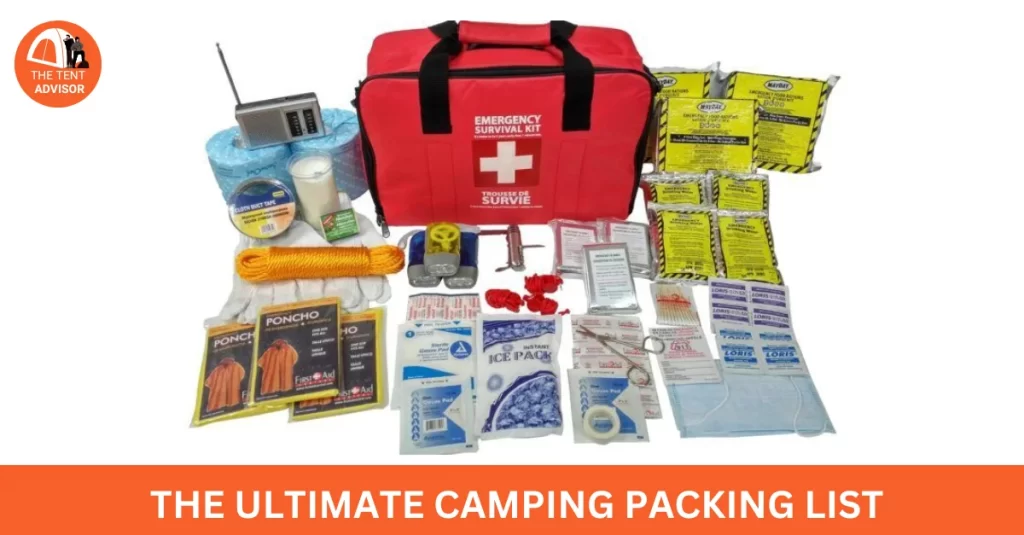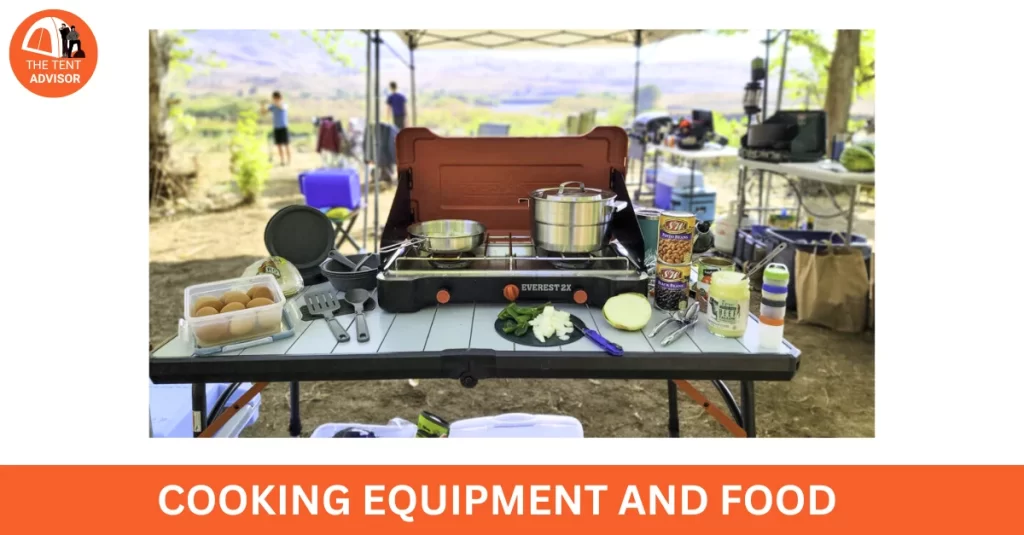Camping is just a thrill. Being outside in nature is also a fantastic way to unwind. Whether it’s a trip to a camp or a harsh exploration into the woods, one must have the complete packing list for his first trip. With the right equipment, camping can be really easy, fun, and hassle-free.
This article provides the ultimate camping checklist to prepare you for your first camping trip. This guide provides most of what you need to make your camping experience pleasant, safe, and memorable.
Why You Need a Camping Checklist
Going camping for the very first time can make you feel like you will forget some necessary things. With a good camping checklist, you can be assured that everything has been packed without giving it a thought.
This will prevent a camper from either carrying unnecessary items or forgetting some extremely necessary ones. It will make him stand ready to enjoy his journey for pure fun rather than looking for a lost old piece of equipment.
By including only the absolute essentials in your trip, you can keep your loved ones safe and comfortable in well-organized conditions. The list would organize the packing of must-haves for every occasion, from tents to cooking gear, since it would otherwise be wonderful or small; whether it lasted one night or a week, it was simply an adventure well worth counting.
1. Backpacking
Backpacking means hiking into the deep wilderness with minimal gear. You must carry everything with you—food, shelter, and water—to ensure your survival in the great outdoors. This type of camping is perfect for those looking to truly disconnect and explore remote areas.
2. Car Camping
Car camping is ideal for beginners or those looking for convenience. You park your vehicle close to an established campsite, giving you quick access to your gear. It’s an easy and comfortable way to enjoy nature without the physical demands of long hikes, making it perfect for those who want a more relaxed camping experience.
3. RV Camping
RV camping combines outdoor adventure with comfort, offering facilities like water, showers, and kitchens for those who seek a more luxurious camping experience. It’s a great option for families or anyone who prefers to enjoy nature without sacrificing amenities. When considering safety, are RVs safer than tents? Many believe RVs provide better protection from the elements and wildlife, offering a more secure and comfortable camping experience.
The Ultimate Camping Packing List for First-Time Campers

1. Camping Must-Haves
First and foremost, the camping essentials for the excursion are safety, comfort, and preparedness. What these mean is very vague and can vary from person to person.
- Tent: A good tent provides some cushioning between your sleep and the harsh weather outside, enabling happiness with hours of sleep.
- Tent Stakes: Hammer them to hold your tent down against the winds on stormy nights.
- Sleeping Bag: Your type of sleeping bag will depend on the temperature at which you will be camping.
- Sleeping Pad: Comfort and insulation against the cold ground.
- Camping Stove: Great items for heating meals away from home.
- Firestarter: Carry matches or a lighter to light fires for warmth or cooking.
- Headlamp/Flashlight: Essential for nighttime travel around the campsite.
- First Aid Kit: Your basic medical supplies, just in case.
- Multi-tool or Swiss Army Knife: Just perfectly designed for taking care of some minor jobs around camp.
- Water Bottle: This is for staying hydrated during the adventure.
- Camping Chair: For now, it is relaxing at the campfire.
Pro Tip:
When tent shopping, ensure you have purchased one of sufficient size to fit everyone. Always practice putting it up at home before heading outside to avoid being confused outdoors.
2. Clothing and Gear
Packing the right clothes is essential for comfort and safety, as is layering suddenly when the weather changes, as it can be with camping.
- Breathable Tops: Cotton T-shirts or lightweight wool up your whole day.
- Convertible Pants: pants that morph into shorts save space and are universal.
- Thermal Base Layers: Thermal wear, such as shirts and leggings, will keep you warm on those cold nights.
- Hiking Boots: Last but not least, these rugged shoes provide support and traction during hiking activities.
- Rain Jacket: You never know when the weather will suddenly change, so always wear a waterproof jacket.
- Sun-hats and Sunglasses: Protection from the sun is something that these two have in common.
- Warm Hat or Beanie: Warm your head from the cold on those chilly nights.
- Gloves: Cold weather and handling wood are impressive reasons for gloves.
Pro Tip:
Pack layers of clothes. Lightweight clothing can be worn in hot weather; for colder weather, more layers and extra socks are needed.
3. Cooking Equipment and Food

Campfire or camping stove cooking can be the highlight of any vacation. Here is a meal preparation checklist.
- Camping Stove and Fuel: The portable camping stove for rapid and easy cooking.
- Cast-Iron Skillet: The heavy skillet used for campfire or stovetop cooking.
- Cooking Pot with Lid: Suitable for boiling water or soups.
- Can Opener: You should never be without canned foods on the menu.
- Spices and Condiments: pepper, salt, or whatever tastes your dish.
- Food-Storage Containers: To store food safely and keep them arranged.
- Cooler: To cool perishables if you are constantly on the go.
- Water Jug: Sufficient water for cooking, drinking, and washing.
Pro Tip:
Prepare meals in advance and select simple-to-prepare recipes. For additional longevity, home-freeze food before loading it into the cooler.
4. Toiletries and Hygiene
When camping outdoors, the person needs to maintain personal hygiene. The following items can be packed to survive the days without cleanliness:
- Biodegradable Soap: Environmentally safe; ideal for washing dishes and hands.
- Toothbrush and Toothpaste: Clean teeth after a meal.
- Shampoo and Conditioner: You should use an eco-friendly version to care for nature.
- Towel: A quick-dry towel is light and terrific for drying off.
- Toilet Paper: Carry extras, as campgrounds may run out.
- Wipes: For rapid cleans when there’s no water.
- Deodorant: Smell fresh while out.
Pro Tip:
If you are camping and need to relieve yourself, bring along a trowel to dig a hole into which to dispose of your personal waste. Always leave no trace for all your neighbors.
5. Safety and Emergency Supplies
Camping safety precautions need to be of the utmost importance. Pack all of these for emergencies:
- First Aid Kit: Medications with various bandages, antiseptics, and painkillers, plus any personal medications.
- A Whistle: In case you get lost or want attention from others.
- Map and Compass: Rely is not on your mobile phone’s GPS as it could have no battery or signal.
- Emergency Blanket: This is thin and light but efficient in keeping you warm during survival situations.
- Fire Extinguisher: So that you are safe when using camp stoves or fire pits.
Pro Tip:
Before going out, brush up on the very basic first aid procedures. Also, let a friend or family member know about your camping plan just in case something goes wrong.
6. Camping Clean-Up and Trash Disposal
A clean campsite is a happy campsite. Remember these things to make cleanup and leaving no trace manageable.
- Tarps: It and the trash were very excited to pack away, plus very future for sizable scenarios.
- Sink Collapse: To wash dishes at a campsite.
- Green Dish Soap: For more environmentally friendly and gentle dishwashing.
- Scrub Brush: For washing cookware and utensils.
- Tide to Go Pen: Spot-cleaning clothes in a pinch.
- Laundry Bag: Because it is for keeping dirty clothes separate from the clean crowd.
Pro tip:
Set up a cleaning schedule and ensure that nothing gets outside the boundaries of the campsite without garbage. Following the Leave No Trace motto has been proven helpful in conserving the wilderness.
Conclusion:
Following the last camping checklist will give you what you require to have fun on your first-ever camping trip. Don’t forget the essentials, consider food and clothing, and ensure you have safety gear. Most importantly, enjoy and make the most of the outdoor experience.
No matter what kind of camping you’re doing— backcountry, car, or RV— a well-equipped bag will be the secret to your comfort. Use this checklist, and you’ll be ready for whatever the great outdoors has in store.
FAQS
What should I pack for shelter and sleeping?
Tents provide shelter, and tent stakes prevent them from blowing away easily. Sleeping bags and pads provide comfort. They keep you warm and dry at night.
2. What food to bring for camping?
Degrease: saucepan, instant ping, traveling mix, and energy bars. Remember to add some fresh fruits and vegetables. Last but not least, remember to bring some water and coffee.
3. What to wear for camping?
Pack light with breathable tops, hiking pants, and warm fleece. You can also include rain clothes and hiking shoes. Don’t forget the essentials, such as socks and sun protection, which you can get from hats and shades.
4. How do I keep clean while camping?
Bring biodegradable soap and hand sanitizer to wash with. Also, bring wet wipes and toilet paper. Carry a quick-dry towel for drying off after washing.
5. Do I need any camping safety gear?
Yes, always have a first aid kit and a multi-tool handy. A flashlight or headlamp is required for nighttime vision. Bug spray and sunscreen will protect you from bugs and sunburns.
